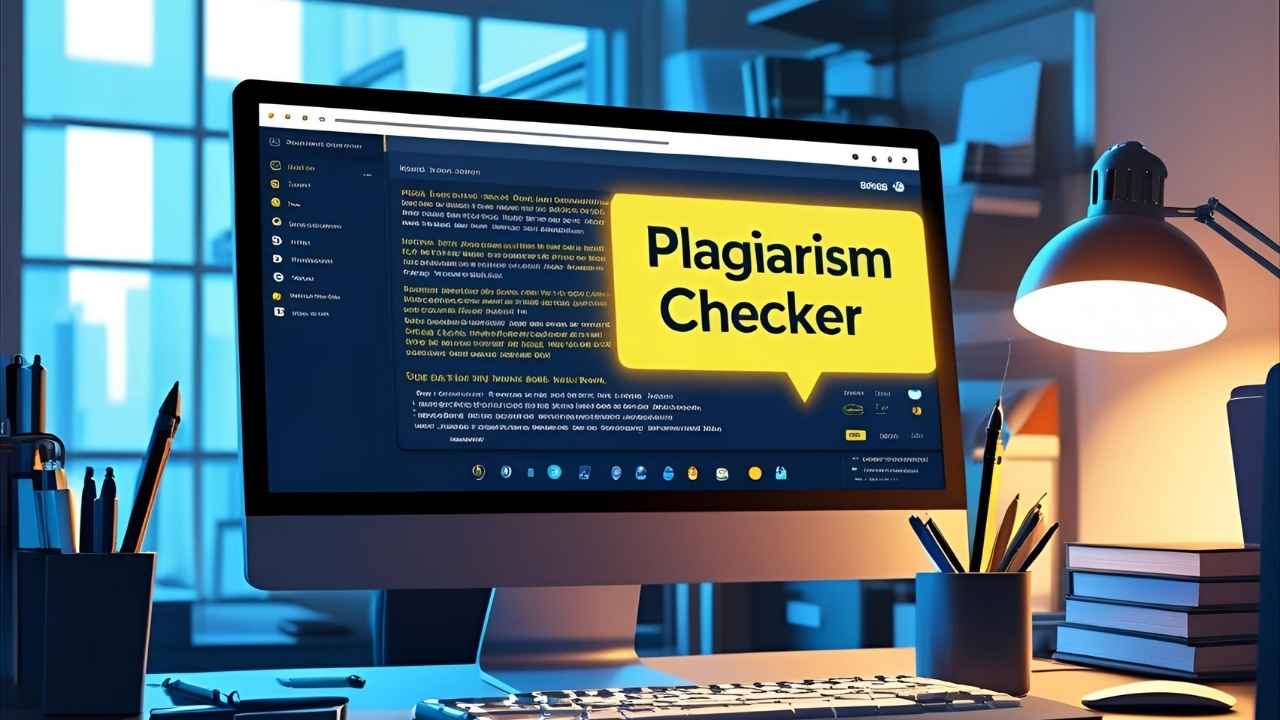Plagiarism, which is the imitation of the work of another person and offering it as your own, may lead to very serious consequences in the form of academic failure, legal liability, loss of reputation, and career opportunities. As countless publications come up and billions of web pages are on the Internet, it is getting harder to be 100% original. That is where the best plagiarism checker tools come to the rescue as your online watchdog against inadvertent or deliberate duplication of content.
The market is awash with different types of plagiarism checking software, all purporting to provide the best results out there. However, not all tools are created equal. Some are good at academic detection, others are more suited to use web content, and some are more suited to multilingual detection. A knowledge of which plagiarism checker tools best suit your particular requirements will save you money, time and possible embarrassment.
You can read through this guide to learn all about the best tools to detect plagiarism in 2025, their capabilities, reliability, costs, and applicability to users of various types. We are going to guide you in the vast sea of choice and pick the ideal dupe detector that fits your needs and that supports uniqueness and avoids plagiarism.
What is a Plagiarism Checker?
A plagiarism checker is an advanced machine that is used to identify the resemblance of your material with other sources on the internet, academic databases, and publication platforms. Such best plagiarism checker tools operate on complicated algorithms, artificial intelligence, and machine learning technology that processes enormous databases of billions of web pages, scholarly articles, books, journals, and past papers submitted.
The mechanism used to detect plagiarism incorporates methods of complex text analysis such as string matching, fingerprinting, and semantic analysis. By sending your text into this type of tool, the tool breaks your text into key points and compares it to its huge databases.
Why You Need a Plagiarism Checker Tool
- Protect Academic and Professional Integrity: This means that by using the best plagiarism checker tools, one would be preserving the ethical standards in the education and professional field, where original work matters the most.
- Avoid Legal Consequences and Copyright Issues: Such tools will assist you in recognizing possible infringements on the copyright prior to publication, thus defending you against expensive legal hassles and copyright infringement implications.
- Enhance Content Quality and Credibility: Employing the best plagiarism tools regularly will allow you to ensure your work will remain of high quality and the audience will continue to trust you.
- Detect Unintentional Plagiarism and Improve Citation Practices: It is a common mistake to add uncited sources, even by a skilled writer; they highlight such mistakes and make you a better reference user.
- Meet Institutional and Publication Requirements: Most learners in academic institutions and publishers have to conduct a plagiarism check with the best checker tools as a part of the submission process.
Key Features to Look for in a Plagiarism Checker
- Comprehensive Database Coverage and Regular Updates: Top-of-the-line plagiarism checking software must tap into huge databases such as academic journals, web pages, and proprietary databases of content.
- Advanced Detection Algorithms and AI Technology: Find out the tools that apply machine learning and artificial intelligence in detecting other types of plagiarism that are more than mere coincidences of written text.
- Detailed Reporting and Source Attribution: Good plagiarism detection tools generate a detailed report of the parallels and direct links to the sources.
- Multi-language Support and Global Content Detection: Select tools that will aid in plagiarism detection of a wider range of languages and international sources of content.
- User-friendly Interface and Integration Capabilities: The most effective plagiarism checking tools must have practical designs and allow easy integration with other common writing tools and learning platforms.
Top 10 Best Plagiarism Checker Tools in 2025: Comparison Table
| Tool Name | Free/Paid | Accuracy | Languages Supported | Report Quality | Best For |
| Grammarly | Paid | 95% | 30+ | Excellent | Students & Professionals |
| Turnitin | Paid | 98% | 30+ | Outstanding | Academic Institutions |
| Quetext | Freemium | 92% | English | Very Good | Students & Writers |
| Copyscape | Paid | 94% | Multiple | Good | Web Content |
| Plagscan | Freemium | 93% | 190+ | Excellent | Educational Use |
| Scribbr | Paid | 96% | English | Outstanding | Academic Writing |
| Unicheck | Paid | 94% | 100+ | Very Good | Educational Institutions |
| ProWritingAid | Paid | 91% | English | Good | Professional Writers |
| Duplichecker | Free | 85% | Multiple | Fair | Basic Checking |
| Small SEO Tools | Free | 82% | Multiple | Fair | SEO & Web Content |
Top 11 Best Plagiarism Checker Tools in 2025
1. Grammarly Plagiarism Checker
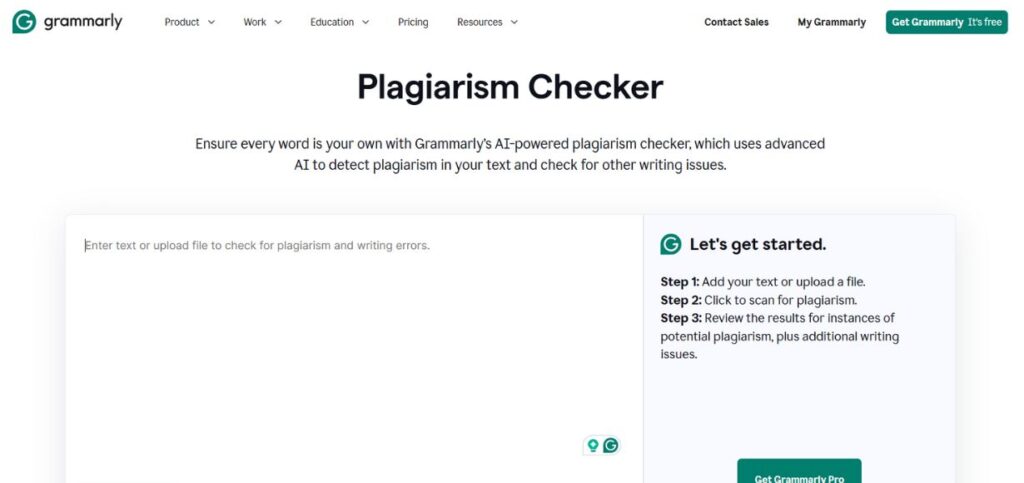
Grammarly plagiarism checker is said to be one of the newest effective plagiarism checker websites since it has good plagiarism tracking and grammar correction, as well as writing assistance. It searches the internet and the scholarly databases on over 16 billion web pages and gives accurate and precise results in seconds. The algorithm used by Grammarly is too advanced to make it detect not only copied but also paraphrased passages, and that is why students, professionals, or content creators would find it beneficial to use Grammarly.
Grammarly provides an additional report on the similarity, which is a percentage, and the real-life linking of the problem regions and the initial files. The library tools, which might be used in citation and make a user realize that he now knows the difference between a legitimate reference and plagiarism, are also at hand.
Key Features:
- Super-sophisticated AI detection
- Real-time scanning
- Extensive composition help
Pros:
- Results are very precise
- An easy-to-use interface design
- Superb customer service
Cons:
- High-priced structure
- Abundant free version
- It needs an internet connection
Pricing: Premium plans start at $12/month with plagiarism checking included in higher-tier subscriptions.
Website: http://grammarly.com
Suggested Blog: Boost Creativity with Envato Grammarly Canva Package
2. Turnitin
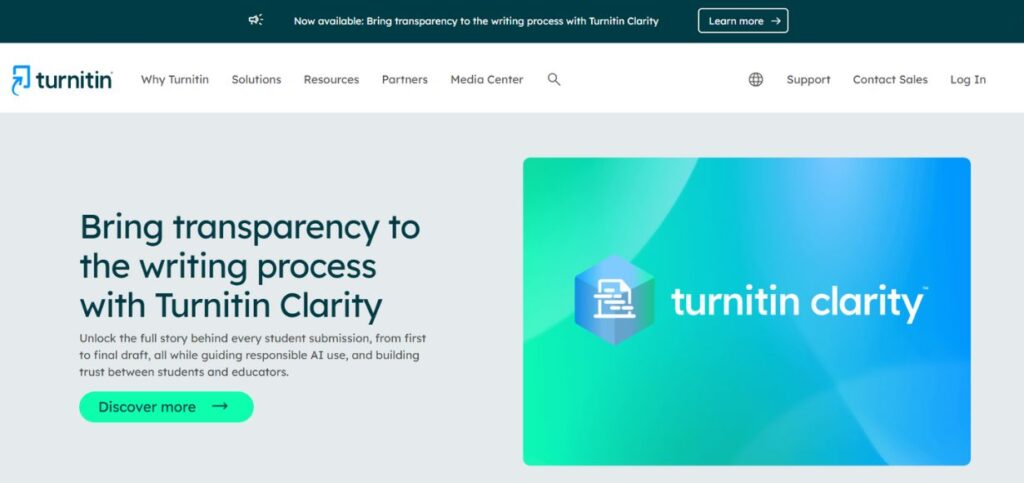
Turnitin is the gold standard of the best plagiarism checker software in the global academic circles. This comprehensive world-class platform has the biggest academic database with more than 70 billion web pages, 170 million student papers, and large deposits of scholarly publications. Turnitin also has high-level algorithms that are able to detect even advanced forms of plagiarism, such as contract cheating, essay mills, and AI-generated materials.
The site provides in-depth similarity reports, including analytics, which allows an educator to detect submissions with issues and educate students on how to correctly attribute work. The Originality Check technology of Turnitin gives a percentage similarity figure and highlights of the works that display similarity in color, which distinguish possible results of the source materials.
Key Features:
- Largest academic database
- Contract cheating detection
- LMS integration capabilities
Pros:
- Institutional standard worldwide
- Comprehensive detection accuracy
- Advanced reporting features
Cons:
- Expensive for individuals
- Academic-focused pricing model
- Complex setup requirements
Pricing: Custom Pricing.
Website: http://turnitin.com
3. Quetext
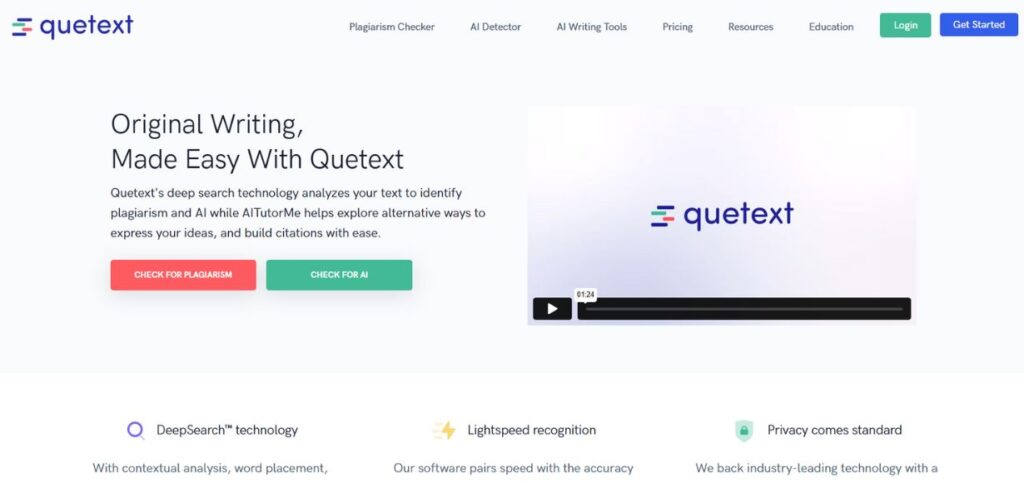
Quetext has become an excellent choice among the tools to check plagiarism because of providing intuitive interface and effective plagiarism detection. With its billions of documents and web pages scanned, this cloud-based system can deliver prompt and effective results to any student, teacher, as well as professional writer.
The DeepSearch technology used by Quetext examines text in context and finds not only identical matches but also paraphrased text. The website provides a free and paid version that ensures plagiarism checking is available to people with varied finances. Free account users are allowed to check up to a limited words, and the premium subscribers have unlimited checks with more features.
Key Features:
- DeepSearch contextual analysis
- ColorGrade feedback system
- Citation assistance tools
Pros:
- Free version available
- Fast processing speed
- Intuitive user interface
Cons:
- Limited database coverage
- English language focus
- Premium features paywall
Pricing: Free version available; Premium plans start at $13.99/month for unlimited checking.
Website: http://quetext.com
4. Copyscape
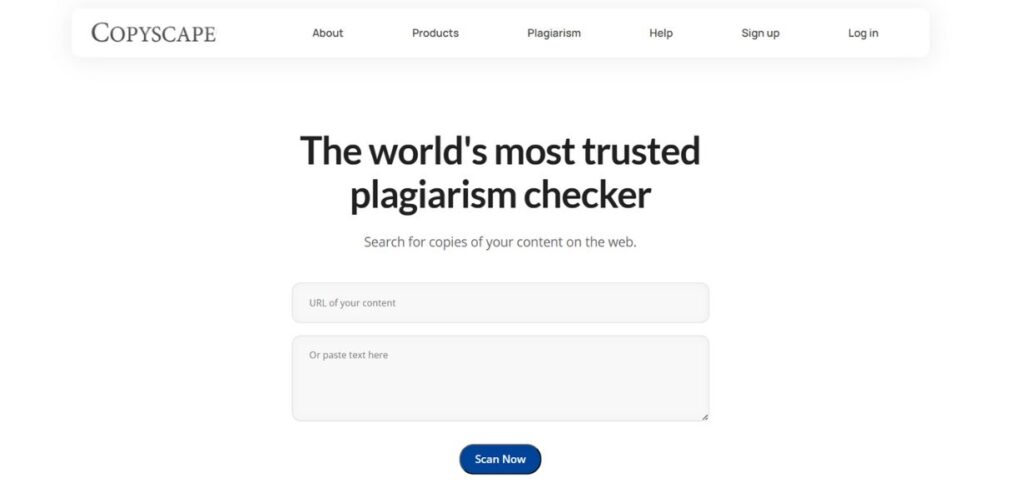
Copyscape is among the top plagiarism checker software meant specifically to handle internet content and online publishers. A specialized platform is excellent when it comes to identifying content theft and unauthorized publication on the internet, and therefore, bloggers, website owners, and digital marketing specialists cannot underestimate the usefulness of this type of platform.
A wide-range web database offered by Copyscape allows locating the illegal usage of your content and the possible plagiarism in new releases. It has both free and premium services, where the free service gives users the ability to check basic duplicate content found, whilst the premium service offers a detailed ability to check batch results.
Key Features:
- Web content specialization
- Batch checking capabilities
- Automated monitoring service
Pros:
- Web-focused detection accuracy
- Affordable pricing structure
- Comprehensive monitoring features
Cons:
- Limited academic database
- Basic reporting interface
- Web content focus
Pricing: Free, Copysentry starts at $4.95/month.
Website: http://copyscape.com
Also read: Best AI Tools For Market Research
5. Plagscan
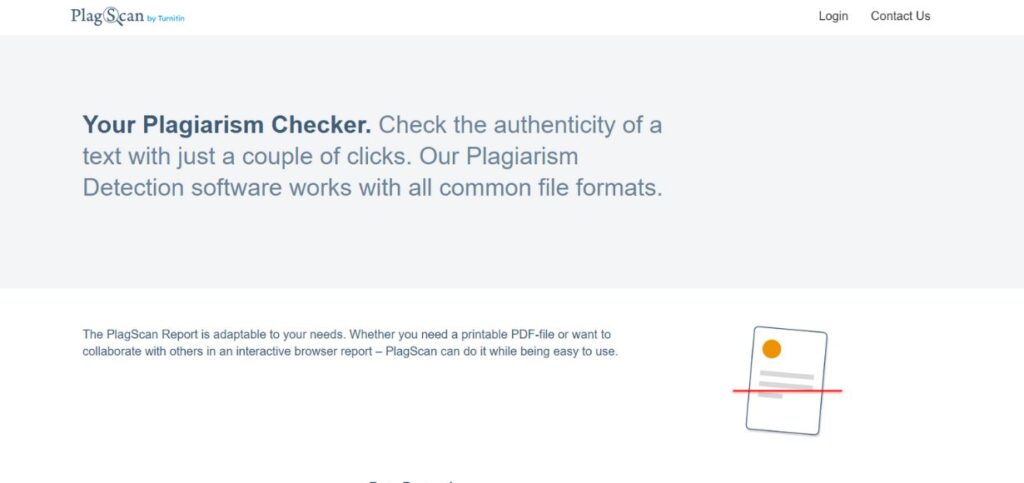
Plagscan is one of the superior plagiarism checker applications to use by educational organizations and teamwork tools. It is an European-hosted service that offers advanced plagiarism checks, strict privacy, and GDPR adherence. Being a broad database, Plagscan engulfs a wide range of scholarly prints as well as internet and institutional repositories that already offer broad rastering of diverse contents. Its functionality is related to the unique collaborative tools that enable one to have several users working on the plagiarism checking project.
The accuracy can be boosted by institutions making their databases of earlier submitted materials of the students, and this can even be done by way of custom-made databases that can increase the detection rate of the repeat submission.
Key Features:
- Multi-language support capability
- Collaborative checking features
- GDPR compliance protection
Pros:
- Strong privacy protection
- Extensive language support
- Institutional collaboration tools
Cons:
- European server limitations
- Complex pricing structure
- Limited free options
Pricing: Free version for small checks; Institutional plans start at €5.99/month per user.
Website: http://plagscan.com
6. Scribbr
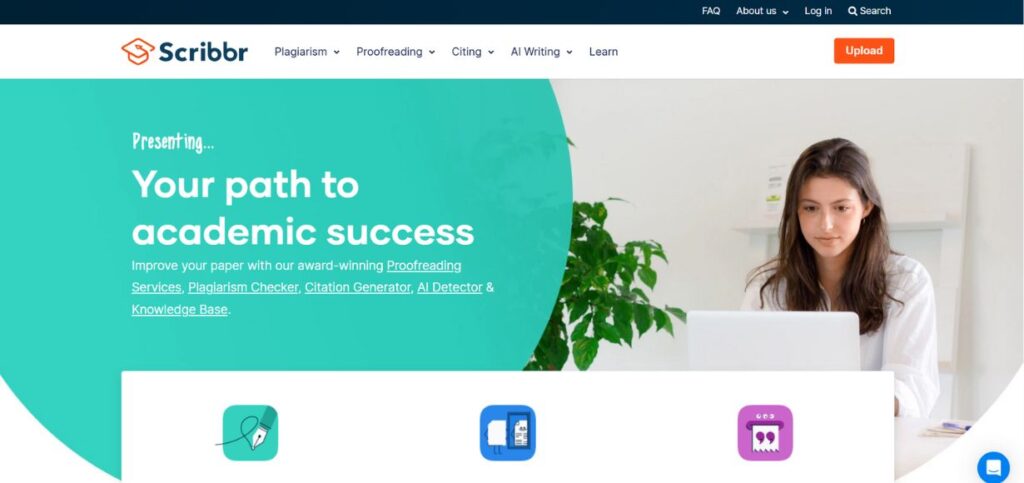
Scribbr qualifies as one of the best plagiarism checking tools by collaborating with Turnitin in providing across-the-board plagiarism checks to individual students and researchers of academic calibre. This education platform offers access to the Turnitin database and algorithms at low individual rates, allowing students around the world to enjoy the professional-level quality of plagiarism checking.
The plagiarism checker offered by Scribbr produces advanced report results detailing possible matching sources in academia, the internet, and fellow students. The site gives the definitions of the similarity scores and covers the method of dealing with possible plagiarism problems. Scribbr also includes citation tools and academic writing resources.
Key Features:
- Turnitin database access
- Educational support resources
- Academic writing guidance
Pros:
- Professional-grade database access
- Student-friendly pricing model
- Excellent customer support
Cons:
- Academic focus limitation
- Per-check pricing model
- Limited free options
Pricing: Individual checks start at $19.95 per document with various package options available.
Website: http://scribbr.com
7. Plagramme
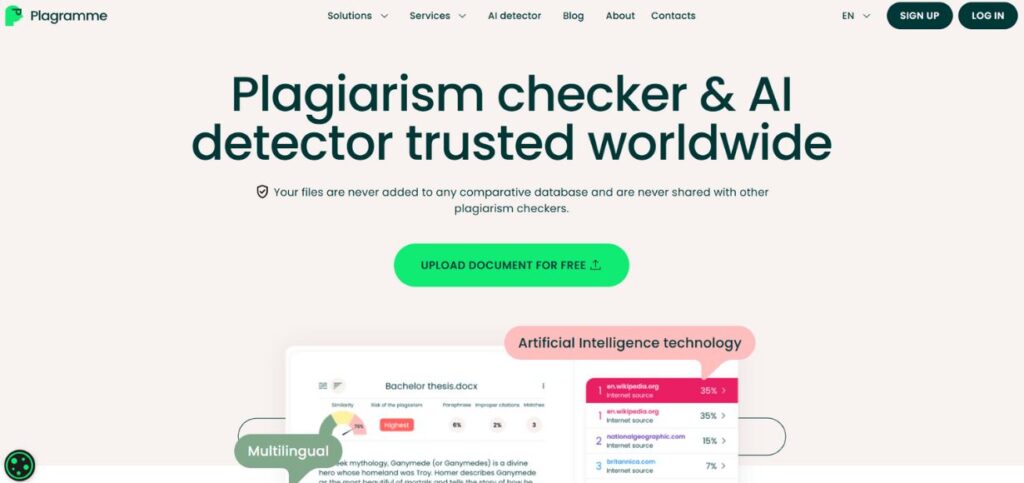
Plagramme is a flexible, easy to use, and plagiarism-checking tool aimed at assisting students, teachers, and professionals to verify the originality of their piece of work. It matches the provided materials with billions of Internet resources, scholarly journals, and internal files, returning an in-depth report of possible resemblances and plagiarism.
The system has many language options; the interface is user-friendly and does not cause any confusion to the user. Plagramme also has real-time verification and presents reports with the results in percentages so that its users can see where it requires citation or updating of the texts.
Key Features:
- On-the-spot plagiarism checking
- Multilingual support
- Detailed similarity entailing links to sources
Pros:
- Unrestricted open access free of any fees with detailed findings
- An easy-to-understand user interface will be useful in writing at school and work
Cons:
- Free tier does not support large documents
- Schedules that increase during rush hours
- Some features can only be accessed by ordering the feature
Pricing: Free basic version; Premium plans available for extended features
Website: https://www.plagramme.com
8. ProWritingAid
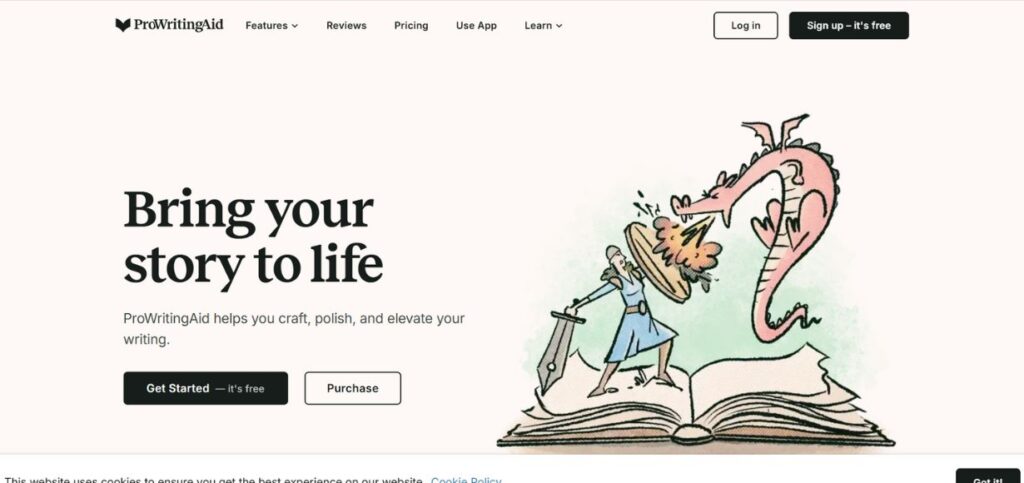
ProWritingAid incorporates s plagiarism checking feature in its writing analysis platform, making it one of the best plagiarism checker tools in the market among professional writers and content developers. This is a convenient addition to plagiarism checking as it also incorporates grammar check, style improvement, readability analysis, and gives a comprehensive solution to writing.
The plagiarism checker on the platform searches web-based information and scholarly databases to detect possible similarities and claims of the source. ProWritingAid gives very detailed reports with highlighted matches and improvement tips. The tool can be used together with several well-known writing providers, such as Microsoft Word, Google Docs, and Scrivener.
Key Features:
- Comprehensive writing analysis
- Multiple platform integration
- Professional writing focus
Pros:
- All-in-one writing solution
- Professional feature set
- Reasonable pricing structure
Cons:
- Limited plagiarism database
- Complex interface layout
- Writing-focused rather specialized
Pricing: Free, premium starts at ₹550.
Website: https://prowritingaid.com/
9. Duplichecker
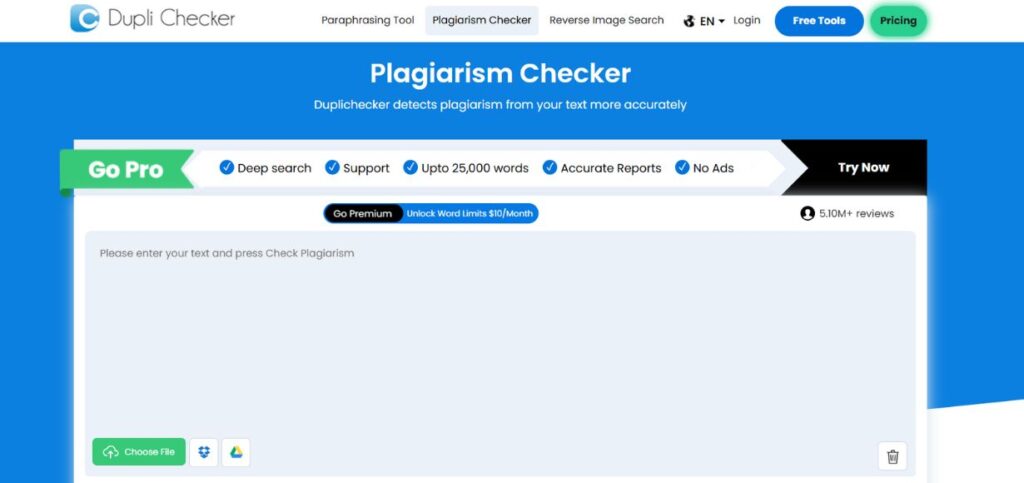
Duplichecker is a free plagiarism checking service provider, thus being ranked among the easiest affordable plagiarism checker tools. The delivered online service helps to check the originality of the internet materials by searching the web and locating possible matches. Duplichecker does not have all the features that come along with the high-quality options, but the basic features offered remain well-suited to the customers who do not want to invest money into a plagiarism checker but still want to test their paper quickly.
The platform provides a variety of checking options, such as entry of texts, uploading files, and URL checking. Duplichecker offers easy similarity reports in highlighted matching and naming basic sources. At a time, the tool handles rather small pieces of text, which necessitates numerous reviews of longer documents.
Key Features:
- Free checking service
- Multiple input methods
- Additional SEO tools
Pros:
- Completely free access
- No registration required
- Quick basic checking
Cons:
- Limited database coverage
- Basic reporting features
- Advertisement-supported interface
Pricing: Free service with premium starts at $25.
Website: http://duplichecker.com
10. Small SEO Tools Plagiarism Checker
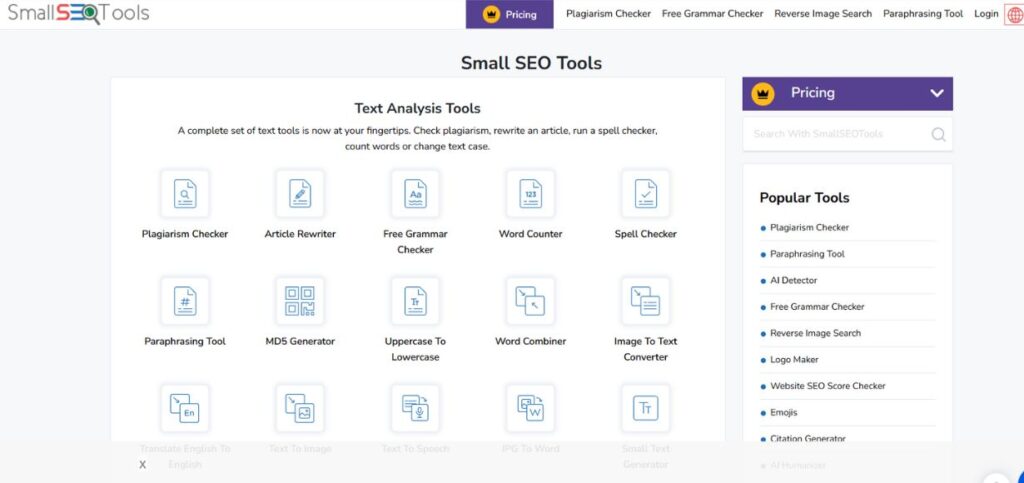
Small SEO Tools offers a free plagiarism checker within its entire arsenal of SEO tools, placing it as an affordable yet high-quality plagiarism checker, one of the best plagiarism checker tools, especially among digital marketers and content providers. It contains a simple plagiarism checker along with a great number of SEO analysis services, which makes this platform useful in case a user requires a range of digital marketing instruments. The plagiarism checker is a simple similarity detector that compares written text to the digital material on the web and possible match evidence.
Small SEO Tools offers basic reports, in which similarities are highlighted and where some of the source information is included. The tool allows a low number of words to be checked at a time, and long content needs several submissions.
Key Features:
- Free comprehensive access
- SEO toolkit integration
- Web-based checking system
Pros:
- Completely free service
- Multiple tool availability
- No software installation
Cons:
- Very limited accuracy
- Basic feature set
- Advertisement-heavy interface
Pricing: Free with premium stars at $14.80/Billed Monthly
Website: smallseotools.com
11. AI or Not

AI or Not is an advanced AI detection platform that identifies artificially generated content across text, images, audio, video, and deepfakes with 98.9% detection accuracy. Featuring seamless API integration, plagiarism detection tools, and content verification capabilities, the platform helps educators, publishers, and academic institutions identify AI-generated submissions and maintain academic integrity without disrupting established grading workflows.
Used by leading organizations including Hitachi, Fox, Telefonica, and Forbes, with a community of 325K+ users conducting millions of authenticity checks, AI or Not enables educational institutions, academic publishers, content creators, and verification services to detect sophisticated AI-generated plagiarism and synthetic content through scalable detection technology ranging from classroom use to institution-wide implementation with custom hosting solutions.
Key Features:
- Multi-format plagiarism detection (text, images, audio, video, deepfakes) with 98.9% accuracy
- Academic integrity screening for student submissions and research paper verification
- Comprehensive API integration with LMS platforms and detailed developer documentation
- Scalable credit-based pricing structure from educator accounts to institutional licenses
- Advanced deployment options including private cloud and on-premise installations for schools
Pros:
- Complete plagiarism detection solution covering all major content formats in one platform
- Established credibility with major organizations and active community of 325K+ verified users
- Flexible API architecture enabling smooth integration with existing educational systems and workflows
Cons:
- Pay-per-use model requires ongoing budget consideration for consistent high-volume academic scanning
- Detection performance may fluctuate as AI generation technology continues advancing rapidly
- Institutional licensing involves personalized pricing rather than standardized academic rate structures
Tips for Avoiding Plagiarism in Your Writing
- Understand Different Types of Plagiarism and Attribution Requirements: Learn to identify direct plagiarism, paraphrasing plagiarism, and academic plagiarism, as well as when and how to best cite the sources with the best plagiarism checker tools to appropriately verify them.
- Develop Strong Note-taking and Source Organization Habits: Keep good notes of each source consulted in research, such as page numbers, the date of publication, and what their exact words are, in order to avoid unintentional plagiarism.
- Master Proper Citation Styles and Reference Formatting: Learn the practice of appropriate citations (APA, MLA, and Chicago), and use the best checker tools to make sure that all sources are treated and referenced correctly.
- Practice Paraphrasing and Summary Writing Techniques: Learn how to state things in your own words and still give it the same meaning, and after that, make sure that you have validated your work using the best plagiarism checker software to give you certainty that it is unique.
- Use Multiple Detection Tools and Regular Checking Throughout Writing: Use different best plagiarism checker tools during the entire writing course instead of demonstrating last drafts that would ensure corrections and enhancements in development.
Conclusion
Using the best plagiarism checker tools on the market today is an important step to academic integrity, credibility, and originality of content. As outlined in this detailed guide, any of the tools under consideration are unique and will help users with their requirements, financial demands, and varying needs. Turnitin and Scribbr offer professional detection levels to academic institutions and serious researchers who have very extensive academic databases. Grammarly and Quetext may be of better use to students and individual writers since they are tools that recognize plagiarism and help to improve your writing. Content writers and those writing online should consider specialized tools such as Copyscape, which has a specialized focus on web-based detecting.
FAQs
What is the most accurate plagiarism checker?
It is well agreed that Turnitin is the most accurate plagiarism checker among the top software, in which its accuracy level stands at 98 percent and access to the highest academic database of over 70 billion web pages and 170 million papers of students. But this may differ depending on the content type and the application.
Is there a 100% free plagiarism checker?
Well, there are some free plagiarism checker tools, but not unlimited. Duplichecker and Small SEO Tools also offer entirely free functionalities, with limited word limits and limited functionalities, among the best plagiarism checker tools. Quetext has a free version that does a few checks, and Plagscan has small free checks.
Can plagiarism checkers detect AI-generated content?
Most of the current superior plagiarism checker resources are becoming ready to identify AI texts, but the precision is not similar. Turnitin now offers AI detection capabilities, and tools such as Grammarly are using AI detection capabilities. But AI detection remains a work in progress, and smart AI-generated material is not always detected.
Do plagiarism checkers store your content?
Content storage policies vary among the best plagiarism checker tools. The detection methodology of Turnitin involves storing the papers entered on their database to be used in future comparisons. Grammarly and ProWritingAid usually delete rather than keep the content, but sometimes they might temporarily cache it to process it.
Which plagiarism checker is best for students?
The most appropriate plagiarism checker tools vary with the budget and institutional needs of the students. Scribbr provides a great product since it accommodates access to a database used by Turnitin at student prices. Grammarly integrates the checking of plagiarism with deep writing support, which makes it useful in enhancing the overall writing quality.
